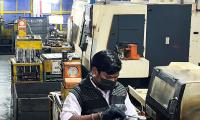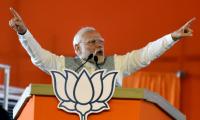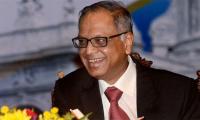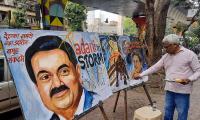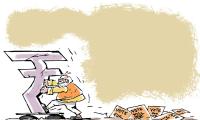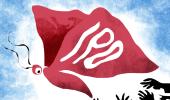Economic Growth & Social Development: Public Policy Key - PK Mishra
PK Mishra, Principal Secretary to the Prime Minister, emphasizes the need for sound public policy for achieving durable economic growth and social development in India. He urges research institutions and students to contribute to policy research.
Mumbai, Jan 4 (PTI) A sound public policy that is transparent, accountable, and effective is needed to achieve faster and durable economic growth and social development, PK Mishra, Principal Secretary to the Prime Minister, said here on Thursday.
Addressing students and faculty at the 19th convocation of the Indira Gandhi Institute of Development Research (IGIDR), he urged the institute and students to contribute to research in a big way so that it can help the country achieve the goal of a developed nation by the turn of 2047 when the nation will be celebrating the first century of freedom.
IGIDR, the premier economic and policy research institute, is run by the Reserve Bank of India.
While Mishra was the chief guest and Reserve Bank Governor Shaktikanta Das, who is also the president of the institute, presided over the ceremony, which awarded three PhD degrees, four MPils and masters degrees (MSc) to 23 students.
A sound public policy that is transparent, accountable, and effective, is needed to achieve economic and social development, he said, and quoted German-American social psychologist Kurt Lewin, who had said 'no research without action, no action without research'.
Economic research, particularly quantitative and empirical research provides insights into complex and dynamic realities of societies, which enable policymakers to assess the needs and preferences of their citizens, evaluate the impact and effectiveness of their interventions, and design policies that are responsive, inclusive and sustainable, he said.
Mishra noted that economic policy research in the country has its roots going back to the five-year plan years, especially the first five such plans.
Economic research can help policymakers identify and understand the problems and opportunities that they face, Mihra said, and pointed out what the Nobel laureate in medicine Albert Szent-Gyorgyi had said: "Research is seeing what everybody else has seen and thinking what nobody else has thought".
By applying rigorous methods and analysis to data, economic researchers can uncover new patterns, trends, relationships, and causalities that can inform policy decisions.
For example, economic research can reveal the drivers and consequences of poverty, inequality, migration and many other phenomena that affect the well-being of people and societies, he said.
Sound economic research can help policymakers formulate and implement policies that are based on facts and logic rather than perception and intuition, he added.
Addressing students and faculty at the 19th convocation of the Indira Gandhi Institute of Development Research (IGIDR), he urged the institute and students to contribute to research in a big way so that it can help the country achieve the goal of a developed nation by the turn of 2047 when the nation will be celebrating the first century of freedom.
IGIDR, the premier economic and policy research institute, is run by the Reserve Bank of India.
While Mishra was the chief guest and Reserve Bank Governor Shaktikanta Das, who is also the president of the institute, presided over the ceremony, which awarded three PhD degrees, four MPils and masters degrees (MSc) to 23 students.
A sound public policy that is transparent, accountable, and effective, is needed to achieve economic and social development, he said, and quoted German-American social psychologist Kurt Lewin, who had said 'no research without action, no action without research'.
Economic research, particularly quantitative and empirical research provides insights into complex and dynamic realities of societies, which enable policymakers to assess the needs and preferences of their citizens, evaluate the impact and effectiveness of their interventions, and design policies that are responsive, inclusive and sustainable, he said.
Mishra noted that economic policy research in the country has its roots going back to the five-year plan years, especially the first five such plans.
Economic research can help policymakers identify and understand the problems and opportunities that they face, Mihra said, and pointed out what the Nobel laureate in medicine Albert Szent-Gyorgyi had said: "Research is seeing what everybody else has seen and thinking what nobody else has thought".
By applying rigorous methods and analysis to data, economic researchers can uncover new patterns, trends, relationships, and causalities that can inform policy decisions.
For example, economic research can reveal the drivers and consequences of poverty, inequality, migration and many other phenomena that affect the well-being of people and societies, he said.
Sound economic research can help policymakers formulate and implement policies that are based on facts and logic rather than perception and intuition, he added.
You May Like To Read
TODAY'S MOST TRADED COMPANIES
- Company Name
- Price
- Volume
- Vodafone-Idea-L
- 11.36 ( -2.49)
- 94664837
- AvanceTechnologies
- 1.16 (+ 4.50)
- 34522155
- Sunshine-Capital
- 0.26 ( -3.70)
- 29015901
- Alstone-Textiles
- 0.27 ( -3.57)
- 28695959
- Mehai-Technology
- 1.65 ( -4.62)
- 28262795
